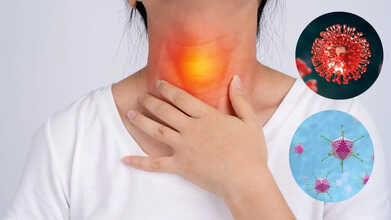- Health Conditions A-Z
- Health & Wellness
- Nutrition
- Fitness
- Health News
- Ayurveda
- Videos
- Medicine A-Z
- Parenting
Short Sleep Is Harmful For Your Brain, But Oversleeping Could Be Even More Dangerous

Credits: Canva
Sleep isn't simply a nightly routine, it's an important pillar of health that dictates everything from mood and energy levels to memory and brain structure. Although the risks of short sleep are well-known, increasing research indicates that sleeping too much is equally, if not more, troubling when it comes to the long-term health of your brain.
A recent study by Professor Jianfeng Feng at the University of Warwick has put forward a new understanding of the sleep-health connection: short and long sleep durations are both biologically different patterns with differing, but significant, risks to mental, emotional, and physical health. The results are a wake-up call for the way we consider our sleep behaviors—not only how much we're lacking, but how much we might be overdoing it.
The study team looked at data from about 500,000 UK Biobank adults aged 38 to 73 and measured how their sleep time corresponded to brain structure and function. Study participants were divided into short sleepers (fewer than 7 hours) and long sleepers (longer than 7 hours), with their brain imaging, genetic information, and health outcomes compared.
Short sleepers had less brain matter in areas of emotional regulation and complained of more depression symptoms, tiredness, and muscle-skeletal complaints.
Long sleepers, on the other hand, exhibited signs of more loss of brain matter in areas of memory, worse metabolic health, increased inflammation, and more risk markers for cognitive decline, Alzheimer's disease, and schizophrenia.
Professor Feng said, "Short sleep is usually an underlying cause of illness, while long sleep tends to be indicative of pre-existing conditions." Simply put, long sleep won't necessarily lead to disease—it could be an early warning sign for them.
Why Oversleeping Is a Red Flag, Not a Luxury?
Sleeping nine or more hours a night on a regular basis—and still feeling tired—is medically referred to as hypersomnia. Unlike occasional weekend lie-ins, hypersomnia signals something deeper. Individuals often report hitting snooze repeatedly, waking up unrefreshed, and struggling with concentration or memory throughout the day.
As per recent evidence in JAMA Neurology, long sleepers scored significantly worse on cognitive assessments such as the Digit Symbol Substitution Test (DSST) and self-reported lower cognitive abilities. The relationship was strongest in older populations, where sleep for more than 10 hours per night was associated with increased risks for dementia and cognitive disorders.
This inverted U-shaped relationship between sleep length and brain functioning—where too little and too much sleep are both associated with worse results—is repeatedly confirmed by various studies.
Oversleeping and Mental Health
Oversleeping isn't only a sign of cognitive problems—it's also associated with mental health. Hypersomnia and depression tend to go hand in hand. About 15% of people with major depressive disorder describe oversleeping as a symptom. Others use excessive sleep as a defense against emotional pain, but it boomerangs. Prolonged sleep worsens depressive symptoms and impairs daytime functioning, creating a vicious cycle.
One big study of more than 24,000 U.S. adults discovered that those who slept more than 10 hours a day had a greater incidence of psychiatric disorders and higher psychological distress. These individuals also had higher rates of early life trauma and unhealed emotional wounds, indicating more profound psychological underpinnings for chronic oversleeping.
Cardiovascular, Metabolic and Inflammatory Risks
The physical health consequences of excessive sleeping are just as disturbing. The American Heart Association research published in Circulation reported that long sleepers had as much as a 50% increased risk of cardiovascular mortality, especially among patients with coronary artery disease.
Oversleeping also leads to:
- Obesity and Type 2 diabetes
- Increased BMI and greater cholesterol imbalance
- Higher pro-inflammatory markers such as C-reactive protein (CRP) and interleukin-6 (IL-6), which are linked to systemic inflammation and risk of disease
Dr. Arshed Quyymi, director of Emory Clinical Cardiovascular Research Institute, highlights the risk: "There is almost a 40 to 50% higher risk of dying if you are sleeping too little or too much."
What is the U-Shaped Curve?
Many meta-analyses reproduce the U-shaped relation between sleep and cognition. Severe durations at both extremes of the curve have been related to increased brain aging. More sophisticated findings, however, indicate that short and long sleep may have an impact on various cognitive abilities. For instance:
Short sleep has a damaging effect on attention, emotional processing, and working memory
Long sleep is related to impairment of decision-making, processing speed, and executive function
These observations highlight the need for individually tailored sleep advice, considering both patient-specific genetic, psychological, and physiological factors.
How to Identify and Address Oversleeping?
So, what can you do if you think you're sleeping too much? Begin by assessing whether this habit has continued for longer than 6-8 weeks and whether you continually feel un-rested after "enough" hours. Prolonged hypersomnia should trigger a visit to a sleep specialist or healthcare provider to exclude underlying causes such as sleep apnea, depression, or thyroid disease.
At-home remedies to reset your sleep habit are:
- Implementing a consistent wake-up time even on weekends
- Positioning the alarm in an inaccessible location to deter snoozing
- Prioritizing early morning activities such as a walk or breakfast rendezvous
- Brushing teeth and washing face the moment you wake up
- Prohibiting returning to bed after rising
- A well-organized, deliberate morning routine can facilitate a stronger, healthier circadian rhythm and better daytime alertness.
Sleep is a keystone of mental and physical well-being, but moderation is required. While chronic sleep loss can impair emotional control and cardiovascular health, routine sleeping too much can herald early neurological deterioration, inflammation, and concealed psychological anguish.
Health professionals are now urging us to shift our way of speaking about sleep—not just about avoiding too little, but about recognizing the dangers of too much. Individualized sleep profiles, according to age, lifestyle, and medical conditions, could provide the best way forward.
If you’re waking up tired every day despite long hours of sleep, it may not be rest your body is craving—it may be time for a deeper health check-in.
How To Cure Hangover Headache At Home?

Credits: Canva
Hangover headaches are miserable. Most people know that drinking too much alcohol can leave you with a long list of next-day problems, and a headache is one of the most common. You will find no shortage of so-called hangover headache “fixes” online, in home remedies, and even on store shelves. The problem is that very few of them are backed by solid scientific evidence. The surest way to prevent a hangover headache is to watch how much alcohol you drink at one time. That said, there are a few simple, home-based steps that may lower your risk of waking up with a headache, and some practical ways to manage the pain if it has already set in.
What Is A Hangover?
A hangover refers to the uncomfortable physical and mental effects you experience after drinking too much alcohol the night before. According to the Cleveland Clinic, hangovers are extremely common among people who overdrink. One study found that nearly 75% of people who consumed excessive alcohol reported hangover symptoms the following day. The same research suggested that about 25% to 30% of drinkers may not experience hangovers at all.
How Much Alcohol Does It Take To Get A Hangover?
Drinking more than one alcoholic beverage per hour can lead to a hangover. Your body generally needs about an hour to break down and process a single drink. As explained by the Cleveland Clinic, one drink is roughly equal to:
- One 12-ounce can of regular or light beer (5% alcohol).
- Half a pint, or about 8 to 9 ounces, of malt liquor or many craft beers (7% alcohol).
- One 5-ounce glass of table wine (12% alcohol).
- One shot, or 1.5 ounces, of liquor (40% alcohol).
How To Cure Hangover Headache At Home?
Many products and home remedies claim they can cure a hangover, but most are not supported by science, and some may even do harm. For instance, having more alcohol the next morning does not fix a hangover. It simply adds more toxins to your system.
Instead, consider these self-care measures for hangover relief:
- Eat simple foods with complex carbohydrates, such as toast or crackers. These can help raise low blood sugar levels and ease nausea.
- Drink plenty of fluids. Water, electrolyte drinks like Gatorade® or Pedialyte®, broth, and other non-alcoholic beverages can help counter dehydration. A good sign you are rehydrated is when your urine becomes clear.
- Get adequate sleep to help your body recover from fatigue.
- Use antacids to calm stomach discomfort.
Consider aspirin or other nonsteroidal anti-inflammatory drugs (NSAIDs) such as ibuprofen or naproxen to relieve aches and pains. NSAIDs are generally the most effective medications for hangover-related pain, but they should be used cautiously because they can irritate your stomach. Avoid acetaminophen (Tylenol), as combining it with alcohol can damage your liver.
Give it time. Hangover symptoms usually improve within eight to 24 hours. During this period, your body works to eliminate alcohol toxins, restore hydration, repair tissues, and return normal body functions to baseline.
Adenovirus vs Cold vs Flu: How To Tell The Difference As This Mystery Illness Spreads

Credits: Canva
Although many people are only now becoming aware of it, adenovirus is being widely described as a “mystery illness spreading worldwide,” and that description feels accurate when you consider how many people are reporting symptoms at the moment. Adenovirus can cause fever, a runny nose, sore throat, and stomach discomfort, which makes it difficult to distinguish from a regular cold or the so-called “super flu” that is currently circulating. If you are feeling unwell, or concerned about catching an infection just before the holiday season, Dr Deborah Lee from Dr Fox Online Pharmacy explains how to tell adenovirus apart from the common cold and from the H3N2 flu strain.
What Is Adenovirus?
Adenovirus refers to a large group of viruses that can lead to infections ranging from mild to more severe. These viruses can affect the respiratory tract, eyes, digestive system, and urinary tract, often causing symptoms that look very similar to a cold or flu.
Adenoviruses are hardy, spread mainly through respiratory droplets, and can infect people throughout the year. Children and individuals with weaker immune systems may experience more serious illness, but most people recover with rest and fluids, according to the Cleveland Clinic.
Adenovirus vs Cold: How Does Adenovirus Differ From Common Cold?
Adenovirus is one of several viruses that can trigger cold-like symptoms. It helps to think of a cold as a set of symptoms rather than a single illness, with adenovirus being just one possible cause. “Adenovirus is just one virus that can cause the common cold,” says Dr Lee. She adds that many other viruses can also be responsible, including respiratory syncytial virus (RSV), rhinoviruses, parainfluenza viruses, and coronaviruses.
Identifying the exact virus behind your cold symptoms is very difficult. “It is pretty much impossible for you or a doctor to know which virus is causing your cold symptoms,” Dr Lee explains.
Adenovirus vs Flu: How Does Adenovirus Differ From The Flu?
“The flu can be extremely unpleasant, whereas adenovirus is usually mild,” Dr Lee says when comparing the two. She explains that flu symptoms often appear suddenly, sometimes within hours, and are usually marked by a high fever and severe discomfort.
According to Dr Lee, flu symptoms can include:
- A high temperature between 38°C and 40°C
- Joint pain and muscle aches
- Headache
- Sore throat
- Blocked or stuffy nose
- Dry cough
- Extreme fatigue
In contrast, adenovirus symptoms, when they appear at all, tend to develop slowly over several days, Dr Lee notes.
Other important differences between adenovirus and flu include:
- Adenovirus infections can occur at any time of year, while flu is more common during winter
- Adenovirus frequently causes pink eye, whereas influenza may lead to red or irritated eyes but less commonly
- Adenovirus often causes digestive symptoms such as vomiting and diarrhoea, while flu can cause these but does so less often
- Adenovirus is generally less likely to cause serious complications than influenza
Adenovirus: How To Tell If You Have Adenovirus Or Cold Or Flu?
Although adenovirus and common cold symptoms often overlap, the intensity of “super flu” symptoms usually stands out. Even so, Dr Lee explains, “The only way to really know the cause of your symptoms is to have a swab taken by a medical practitioner. This may be from the nose, throat, eye, urine, or stool.”
In most cases, testing is unnecessary and unlikely to be offered. “Because the vast majority of these viral infections are mild and self-limiting, this is rarely done,” says Dr Lee. “Treatment for any cold is symptomatic only.” She adds that extra caution is needed for babies and young children, older adults, pregnant women, and people with weakened immune systems.
New Flu Symptoms Raise Alarm As ‘Aggressive’ Strain Spreads Rapidly: Where Is It Spreading The Most In US

Credits: Canva
A newly identified flu strain that spreads easily and causes more severe illness is driving infections this season. The strain, a mutated form of influenza A H3N2 known as subclade K, has been linked to a growing number of cases worldwide, including across the United States.
According to the World Health Organization, the K variant represents “a notable evolution in influenza A (H3N2) viruses,” prompting concerns among experts about how well this season’s flu vaccine may work against it.
Health specialists say the K variant is associated with stronger flu symptoms such as fever, chills, headaches, exhaustion, cough, sore throat, and a runny nose. A CDC report found that of the 216 influenza A(H3N2) samples collected since September 28, nearly 90 percent were identified as subclade K. As this strain continues to circulate, here is a closer look at the symptoms being reported and the areas where flu activity is currently highest.
New Flu Symptoms
Doctors say the symptoms caused by the mutated H3N2 strain closely resemble those of typical seasonal influenza A. Common symptoms include:
- Fever
- Chills
- Body aches
- Headache
- Severe fatigue
- Nasal congestion or a runny nose
- Cough
Flu symptoms often come on abruptly, Hopkins explains, describing it as a sudden, overwhelming feeling of being unwell.
The CDC notes that flu symptoms can overlap with those of COVID-19 and other respiratory viruses, making testing important. Three-in-one rapid home tests that check for influenza A, influenza B, and COVID-19 are now available, and experts advise keeping them on hand when possible. If you test positive for the flu, antiviral medications may help shorten the illness and lessen symptom severity, Hopkins adds.
Flu Shots: Where Is Subclade K Spreading In The US?
Below are the states and regions reporting the highest levels of medical visits related to flu-like illness, which may not reflect confirmed flu cases. The data reflects CDC reporting for the week ending December 25.
Very High (Level 1)
- New York City
Very High (Level 2)
- New York State
Very High (Level 3)
- New Jersey
- Rhode Island
- Louisiana
- Colorado
High (Level 1)
- Massachusetts
- Connecticut
- Michigan
- Idaho
- South Carolina
High (Level 2)
- New Mexico
High (Level 3)
- Washington, D.C.
- Maryland
- North Carolina
- Georgia
The CDC estimates that the flu has already caused at least 4.6 million illnesses, 49,000 hospitalizations, and 1,900 deaths so far this season. Health officials continue to recommend the flu vaccine as the most effective way to reduce the risk of serious illness.
Super Flu Symptoms: How to Protect Yourself From the Flu
During peak respiratory virus season, experts advise taking basic precautions to lower your risk and protect others:
- Keep vaccinations up to date.
- Get tested if symptoms appear.
- If you test positive, stay home until you are fever-free for 24 hours without medication and your symptoms are improving. If you do not have a fever, remain home for five days after symptoms begin.
- Avoid close contact with people who are sick.
- Wear a mask in crowded indoor settings.
- Wash your hands often.
- Cover your mouth and nose when coughing or sneezing.
© 2024 Bennett, Coleman & Company Limited

